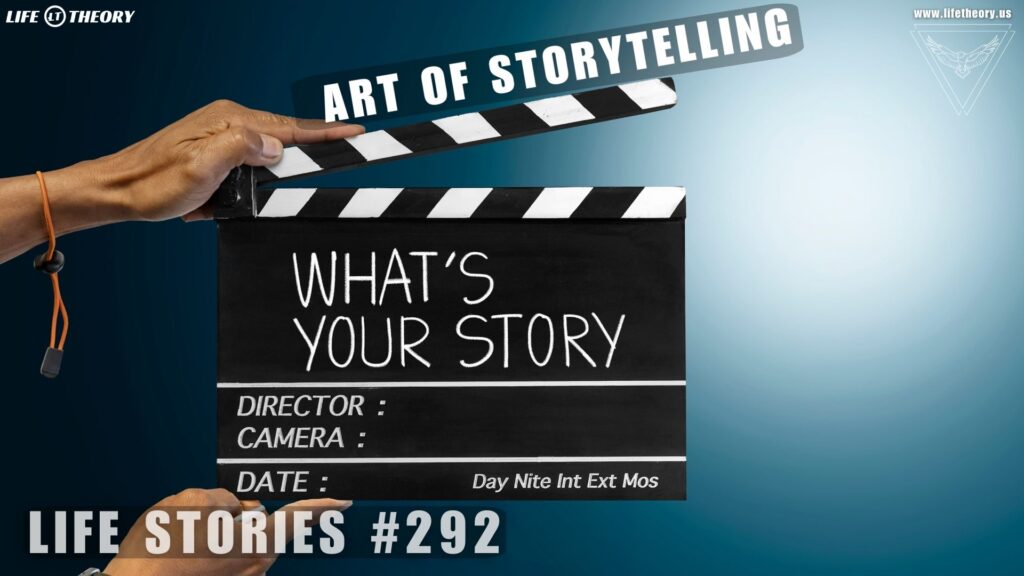Don’t Want To Read?
Watch/Listen To The Full Video on YouTube
From ancient fireside tales to the golden age of radio, storytelling has been the heartbeat of human connection. Long before books and screens, words alone transported us, shaping how we understand the world. But in an era of passive consumption, have we lost the magic? The rise of podcasts and audiobooks suggests we crave something more—voices that spark imagination, stories that make us feel alive.
SUBSCRIBE: https://www.youtube.com/@LifeTheory46
The Timeless Art of Storytelling – Life Stories 292
Human beings have always been storytellers. It’s in our nature to share, imagine, and weave tales that transport us far beyond our immediate surroundings. Think back to your childhood—if you were fortunate, bedtime stories filled your dreams with adventures and distant places, setting the stage for the magic of imagination. There’s a special kind of alchemy that happens when you hear someone else’s voice guiding your mind’s eye, crafting a narrative that comes alive inside your head. It’s as if their words form a bridge, merging your thoughts with theirs, creating a shared emotional journey. This connection exists not only in person but also through the spoken word on the radio, podcasts, and audiobooks, binding us together even across great distances.
Historians and archaeologists believe that storytelling began shortly after the emergence of language itself, a tool as vital for survival as it was for connection. The earliest forms of narrative weren’t written; they were carved into cave walls some 300,000 years ago, depicting animals, people, and symbols that conveyed meaning long before language was refined. Though initially used for survival—to share essential information—storytelling soon evolved into something more. By 30,000 years ago, humans were already setting aside time to entertain one another through spoken word, bringing tales to life by the flicker of firelight.
This oral tradition continued for millennia. Even the most respected philosophers and thinkers used stories to impart their teachings. Consider Epictetus, a stoic philosopher who, though born into slavery, captivated audiences across the ancient world with his profound insights. He never wrote down a single word himself; instead, his lessons were passed down by students who transcribed his spoken teachings. Imagine the power of his voice, the skill in his storytelling that drew people from all corners to listen and learn. It wasn’t just what he said but how he said it that carried his ideas through time, like the great epic poems recited long before they were ever recorded in writing.
Then came the invention of the radio in the late 19th century, a breakthrough that transformed storytelling yet again. Italian inventor Guglielmo Marconi’s experiments with wireless communication led to the first radio transmission in 1895, and by 1897, he had secured the initial patent for the technology. Although developed initially for military use, the radio quickly became a household staple. By the 1930s, families would gather in the evenings to listen to radio shows that delivered news, entertainment, and stories, all brought to life by the voices on the airwaves. It wasn’t just background noise—it was a ritual that brought people together, forging a connection through the shared experience of listening.
Today, our brains respond to stories much like they did thousands of years ago. When we listen, our auditory cortex becomes active, processing the words and engaging the parts of our brain that deal with language and emotion. A well-told story can even trick the mind into feeling as though we’re part of the experience, a phenomenon that makes narratives so immersive. We’re hardwired to connect through storytelling, with an estimated 65% of our communication involving some form of narrative. It’s a way to share memories, exchange experiences, and build bonds through laughter, empathy, and understanding.
Yet, with the rise of visual media, some of that magic has been lost. Television and social media offer instant gratification but often bypass the depth of engagement found in the spoken word. Our minds enter a passive state, consuming rather than creating. But a resurgence is underway; the popularity of podcasts and audiobooks shows that people crave more than just entertainment. We long for genuine connection, for voices that invite our minds to fill in the details and spark our imaginations.
So, here’s a reminder to reconnect with the power of storytelling. Turn off the screens and tune in to something that makes your mind wander. Listen to a podcast, dive into an audiobook, or simply ask the people around you to share a story. Let your imagination take over, picturing the scenes and feeling the emotions as if you were truly there. Because in stories, we find more than just words—we discover a timeless link to one another, a way to make sense of life, inspire action, and evoke empathy.
After all, stories are more than entertainment; they are the essence of what it means to be human, connecting us across generations and distances, as they always have.
–> Read More Life Stories Here:
https://www.lifetheory.us
https://www.lifetheory.eu
Buy all of our Life Stories & Our Premium Learning Packs. Listen or Read to them anytime you want. Have them Forever.
You can get each monthly lesson on our website at https://www.skyboy46.com/store
SHARE THIS STORY
Visit Our Store
SHOP NOW
www.skyboy46.com & www.myskypet.com
Designed For Pet Lovers & Introverted Souls
Sport, Hobbies, Motivation, Music & Art






~EXPLORE MORE~
www.linktr.ee/skyboy46



